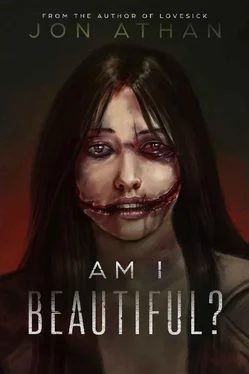Yuuto claimed that he had heard the woman was caught cheating by an envious boyfriend. Her lover punished her by taking away her beauty, permanently disfiguring her face before abandoning her. Yuuto didn’t believe the woman was a traditional ghost, though. He argued that she was still alive but she was possessed by a demon with a hunger for youthful beauty.
Riku said, “ Sorewa kanashiine. Demo… ”
‘ It sounds sad. But… ’
Her eyes widened, then shrank. The boys puckered their lips and cocked their heads to the side, baffled by her sudden silence. Realizing she was looking past them, they peeked over their shoulders. Kaito puffed out a short gasp while Yuuto’s legs rocked. They saw the curtains swaying in the apartment. They searched for the old woman, hoping she would protect them, but she was gone.
Then the curtains moved again, revealing a humanoid figure in the apartment. It could have been anyone, but the kids immediately assumed it was the disfigured woman—a ghost or a demon .
Miki watched the scared little children from her kitchen, hatred burning in her eyes. It had been about a year and a half since the assault at her San’ya apartment. She now lived in Adachi-ku, Tokyo, a similar district but not as impoverished. A jagged atrophic scar stretched across her left cheek, and another atrophic scar curved across her right cheek. The skin around the scars was red. The scars on the bridge of her nose and forehead were light but noticeable.
She had tried to move on. She moved from her old neighborhood to get away from the gossip and judgment. She introduced herself to her new neighbors. They welcomed her with smiles, but they never accepted her invitations to spend time together. Assuming her neighbors shunned her because of her appearance, she attempted to connect with the community’s youth.
To her utter dismay, every college student, teenager, and child reacted fearfully upon seeing her scars when she approached them. Some ran from her, a few laughed at her, and others pretended like she didn’t exist. Yuuto’s neighbor ran from her, that part of the story was true, but Miki didn’t chase her. She was devastated when the girl started screaming after she took off her mask.
Miki couldn’t hear the kids at the park from her kitchen, but she recognized their fear from afar. Most people didn’t mind her scars—they weren’t pleasant but they weren’t revolting either—but she had been visited by the police several times since her wounds had healed due to complaints from the local parents. They had often complained about Miki frightening their children with her mere existence.
The world rejected her, turning her into an outcast. Instead of accepting her disfigurements, society asked her to consider plastic surgery to reconstruct her past beauty. Instead of comforting her after the traumatizing attack, society blamed her for welcoming a violent man into her home. She was sick and tired of society.
Anger opened the door to hatred. She ground her teeth and clenched her fists. Her gaze darted to the knife in the sink. A need for vengeance fueled the raging fire of violent thoughts in her mind. She never hurt anyone in her life, but the temptations grew stronger.
They made me like this, so they deserve to die, she reasoned.
She reached for the knife, stopping with her fingers just an inch away from the handle. Thin layers of tears coated her eyes. Her hand trembled, then her entire arm shook. She felt like an invisible force was pulling her arm back. She didn’t realize she was wrestling with her conscience.
“ Kuso! ” she yelled as she jerked her arm away.
‘ Kuso ’ translated to ‘ damn it ’ or ‘ shit. ’
She looked out the window. The children were still in the park, watching her home and gossiping. She swiped at the tears in her eyes, then she adjusted her hair.
One more try, she thought.
She exited her apartment. The chilly wind bit her face. She felt the sting on her scarred cheeks the most. She stepped back into her home and grabbed the beige trench coat in the entryway. She walked over to the park while buttoning her coat. As soon as she crossed the street in front of her apartment, the kids shrieked. She looked up and saw them running and crying.
“ Tasukete! ” Riku’s cry for help echoed through the neighborhood.
Miki stood with her hands on one of her coat’s buttons, fingers shaking, legs rocking, tears welling. Her last spark of optimism was extinguished. She fell to her knees and opened her mouth as wide as humanly possible. Tears spilled down her scarred cheeks. She cried, but she didn’t make a sound.
The quietest cries were often the most pained.
The cicadas in the trees sang an ear-splitting song of chirping and whirring , announcing the arrival of summer. The crops in the field of edamame soybeans rustled with the wind while large trucks barreled down the countryside’s narrow roads. Vast swathes of trees and foliage separated the few houses and small shops in the area. Golden rays of sunlight bathed the area as nighttime slowly approached.
Mei Hasegawa, a six-year-old Japanese girl, stood at the side of the road, thumbs hooked under the straps of her bulky backpack. She wore a pink t-shirt, denim shortalls, sneakers, and a bright yellow hat, locks of short black hair sticking out from underneath it. In Japan, first-grade elementary school students wore the yellow hats to warn motorists of their presence.
Mei tilted her head to the side and squinted at the woman across the street—a little less than four meters away. And Miki stared back at her from the other side of the road, face covered in a black cloth mask. Her forehead was beaded with sweat, body smothered by a heavy trench coat. Mei wasn’t scared of her, though. She figured Miki was wearing the mask because of allergies. She saw dozens of people wearing masks every day. She was curious about her coat, though.
As Miki took a step forward, Mei raised her hand—palm out, fingers up—and shouted, “Matte!” ‘ Matte ’ translated to ‘wait.’ Miki did as she was told. Like the girl, she cocked her head to the side in confusion. Mei said, “ Kichinto mawariwo minaito. Kiwotsukete. ”
‘ You have to look both ways before you cross. Please be careful. ’
The corners of Miki’s eyes wrinkled as she smiled behind her mask. She was amused by the child. She looked to her left, then to her right. The road was empty. She strode across the street.
“ Konbanwa, ” she said as she stopped in front of the girl.
‘ Good evening. ’
Mei responded, “ Konbanwa. ”
Miki asked, “ Kokode nanishiteruno? ”
‘ What are you doing here? ’
Mei said, “ Mama wo matteruno. ”
‘ Waiting for my mom. ’
Due to its status as one of the safest countries in the world, it wasn’t uncommon to see children waiting by themselves after school in Japan. Statistics often lulled people into a false sense of security.
Miki asked, “ Gakkowa doudatta? ”
‘ How was school? ’
Mei shrugged, as if to say: Whatever . Miki snickered. She didn’t enjoy school when she was a child, either. She felt comfortable around the girl, too. A long time had passed since her last pleasant conversation with another person.
Miki asked, “Hitoride daijōbu? Mama itsu kuruno?”
‘ Are you okay here by yourself? When is your mom coming to pick you up? ’
“ Daijōbu ,” Mei answered. “ Itsumo osoikara. ”
‘ I’m okay. My mom is always a little late. ’
Читать дальше












